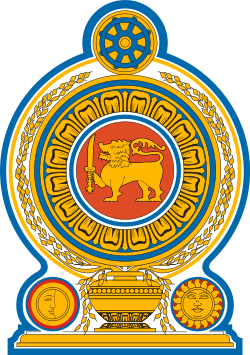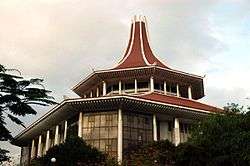Chief Justice of Sri Lanka
| Chief Justice of Sri Lanka
අග්ර විනිශ්චයකාර | |
|---|---|
| Style | The Honourable Justice/His Lordship |
| Nominator | The President |
| Appointer |
The President with Constitutional Council advice and consent |
| Term length | Until the age of sixty-five years |
| Constituting instrument | Royal Charter of Justice of 1801 |
| Formation | March 1801 |
| First holder | Codrington Edmund Carrington |
 |
| This article is part of a series on the politics and government of Sri Lanka |
|
|
Political parties |
|
|
|
|
Foreign policy |
|
Related issues
|
The Chief Justice of Sri Lanka is the head of the judicial system of Sri Lanka and is the chief judge of the Supreme Court of Sri Lanka. The Chief Justice is one of ten Supreme Court justices; the other nine are the Puisne Justices of the Supreme Court of Sri Lanka. The post was created in 1801.
The Chief Justice is appointed by the President of Sri Lanka with the nomination of the Parliamentary Council. The Chief Justice, The Justices of the Supreme Court and The Justices of the Court of Appeal are addressed as "Your Lordship" and receives the title "The Honourable Justice".
The first Chief Justice was Codrington Edmund Carrington. The 44th and current Chief Justice is His Lordship Justice Kanagasabapathy Sripavan.[1]
History
The office of Chief Justice traces its origins back with the founding the Royal Charter of Justice of 1801 by the British. With the establishment of the Supreme Court it was to consist of one principal Judge who shall be called "The Chief Justice of the Supreme Court of Judicature in the Island of Ceylon" and One other Judge, who was to be called "The Puisne Justice of the Supreme Court of Judicature in the Island of Ceylon". The charter required the Chief Justice and Puisne Justice to have not less than Five Years experience as Barristers, in England or Ireland to be named and appointed.
The post was first held by Codrington Edmund Carrington.[2]
- 2013-2015
The Chief Justice Mohan Peiris PC was appointed on 15 January 2013 following the controversial Impeachment of Shirani Bandaranayake. Peiris was elevated by President Mahinda Rajapaksa with the approval of the Parliamentary Council. Peiris' appointment drew some criticism. Peiris is considered to be an ally of President Rajapaksa and his appointment was seen by critics as further consolidation of power by the president and his family.[3][4] Prior to his appointment he was Chairman of Seylan Bank, Senior Legal Officer to the Cabinet and held the post of Attorney General. Peiris was officially inaugurated as Chief Justice at a ceremony in the Supreme Court on 23 January 2013. On 28 January 2015 Peiris was removed from office and his tenure demoted as de facto Chief Justice as the Government of Sri Lanka acknowledged that his appointment was void at its inception as the sitting Judge, Shirani Bandaranayake was not impeached lawfully and therefore no vacancy existed for the post.
Current Chief Justice
The current Chief Justice is The Honourable Kanagasabapathy Sripavan, the 44th Chief Justice.
Appointment
- Appointment
The appointment and removal of Judges of the Supreme Court is outlined in Chapter XV Article 107. of the Sri Lankan Constitution. It states that "the Chief Justice and every other Judge of the Supreme Court shall be appointed by the President of the Republic by warrant under his hand". Judges of the Supreme Court shall hold office until the age of retirement of sixty-five years. Article 109. describes appointments of an acting Chief Justice or Judge of the Supreme Court. The President shall appoint another Judge of the Supreme Court to act in the office of Chief Justice when the incumbent is "temporarily unable to exercise, perform and discharge the powers, duties and functions of his office, by reason of illness, absence from the country or any other cause" during such period. Each person appointed to or to act as Chief Justice or a Judge of the Supreme Court shall only take office and enter upon its duties after he or she takes and subscribes or makes and subscribes before the President, the oath or the affirmation set out in the Fourth Schedule of the Constitution.[5]
- Oath of office
"I ............................................................. do solemnly declare and affirm / swear that I will faithfully perform the duties and discharge the functions of the office of Chief Justice in accordance with the Constitution of the Democratic Socialist Republic of Sri Lanka and the law, and that I will be faithful to the Republic of Sri Lanka and that I will to the best of my ability uphold and defend the Constitution of the Democratic Socialist Republic of Sri Lanka."[6]
- Removal of office
Judges of the Supreme Court shall hold office during good behaviour. Removal of a judge shall only proceed with an address of the Parliament supported by a majority of the total number of Members of Parliament, (including those who are not present), and then by an order of the President. Reasons for such removal should be on the grounds of proved misbehaviour or incapacity.[5]
Duties
The Chief Justice serves as Chairman of the Judicial Service Commission (JSC) which consist two Judges of the Supreme Court appointed by the President of the Republic.[5] The mission of the JSC is to accelerate the Development of the Nation by Ensuring Prompt and Equal Protection of the Law to Every Citizen through providing Infrastructure Services required for Administration of Justice, safeguarding the Independence of Judges and maintaining proper Human Resources Management in the support staffs in Court. Other duties of the Chief Justice include nominating judges, as may be necessary, to each such High Court. Every Judge shall be transferable by the Chief Justice.[7]
List of Chief Justices
- § Served as provisional
- ¤ Chief Justice and President of the Council
- ° Impeachment charges brought against
- ♦ Elevated from Associate Justice
- † Died in office
- ♠ Tenure demoted to de facto
Data based on:
- A. Ranjit B. Amerasinghe|Amerasinghe, A. Ranjit B (1986), The Supreme Court of Sri Lanka: the first 185 years, Sarvodaya [8]
- Chief Justices, 2009, Judicial Service Commission Secretariat[9]
See also
- List of Acting Chief Justice of Sri Lanka
- List of Justices of the Supreme Court of Sri Lanka
- List of Justices of the Supreme Court of Sri Lanka by court composition
References
- ↑ http://adaderana.lk/news/29632/k-sripavan-sworn-in-as-chief-justice
- ↑ "History of Supreme Court". Supreme Court of Sri Lanka. Retrieved 17 November 2013.
- ↑ Crabtree, James (15 January 2013). "Sri Lanka appoints new chief justice". Financial Times.
- ↑ Francis, Krishan (15 January 2013). "Sri Lankan leader replaces chief justice with ally". The Guardian/Associated Press.
- 1 2 3 "Chapter XV - The Judiciary". Constitution of Sri Lanka. priu.gov.lk. Retrieved 17 November 2013.
- ↑ "Fourth Schedule". Constitution of Sri Lanka. priu.gov.lk. Retrieved 17 November 2013.
- ↑ "Chapter XVIIA". Constitution of Sri Lanka. priu.gov.lk. Retrieved 17 November 2013.
- ↑ Amerasinghe, A. Ranjit B (1986), The Supreme Court of Sri Lanka : the first 185 years, Sarvodaya Book Pub. Services, ISBN 978-955-599-000-4
- ↑ "Overview". Judicial Service Commission Secretariat. Retrieved 19 October 2013.
